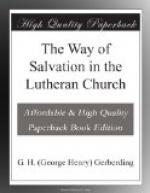Is either of the above views the correct and scriptural one? If not, what is the Bible doctrine on this subject? What has the human will—i.e., the choosing and determining faculty of the mind—to do with conversion? What, if any part of the work, is to be ascribed to it? Is it a factor in the process? If so, in what respect, and to what extent? Where does its activity begin or end? In how far is the human will responsible for the accomplishment or non-accomplishment of this change? These questions we shall endeavor briefly and plainly to answer.
We must necessarily return to man as he is before his conversion, while still in his natural, sinful, unrenewed state. In this state of sin, the will shares, in common with all the other parts of his being, the ruin and corruption resulting from the fall. The natural man has the “understanding darkened;” “is alienated from the life of God, through the ignorance that is in him, because of the blindness of his heart.” He “receiveth not the things of the Spirit of God ... neither can he know them.” He is “in darkness,” “dead in trespasses and sins.”
Thus is the whole man in darkness, blindness, ignorance, slavery to Satan, and at enmity with God. He is in a state of spiritual death. The will is equally affected by this total depravity. If the natural man cannot even see, discern, or know the things of the Spirit, how much less can he will to do them!
Before his conversion, man is utterly impotent “to will or to do” anything towards his renewal. The strong words of Luther, as quoted in the Form of Concord, are strictly scriptural: “In spiritual and divine things which pertain to the salvation of the soul, man is like a pillar of salt, like Lot’s wife, yea, like a log and a stone, like a lifeless statue, which uses neither eyes nor mouth, neither senses nor heart.” (Matt. iii. 9.) But that same God who could, out of the very stones, raise up spiritual children to Abraham, can also change the stony heart of man, and put life into those who were dead in trespasses and sins.
The first movement, however, must always be from God to the sinner, and not from the sinner to God. God does, indeed, in His great mercy, come first to us. This He does through His own means of Grace.
In holy baptism He meets us even on the threshold of existence, takes us into His loving arms, places His hands in blessing upon our heads, breathes into us a new life, and adopts us into His own family. If the sinner afterwards fall from this baptismal Grace, goes back into the ways of sin, and breaks his side of the covenant, God is still faithful and comes to him again by His Holy Spirit through His Word; strives with him and endeavors to turn or convert him again from darkness to light, and from the power of Satan unto God.




